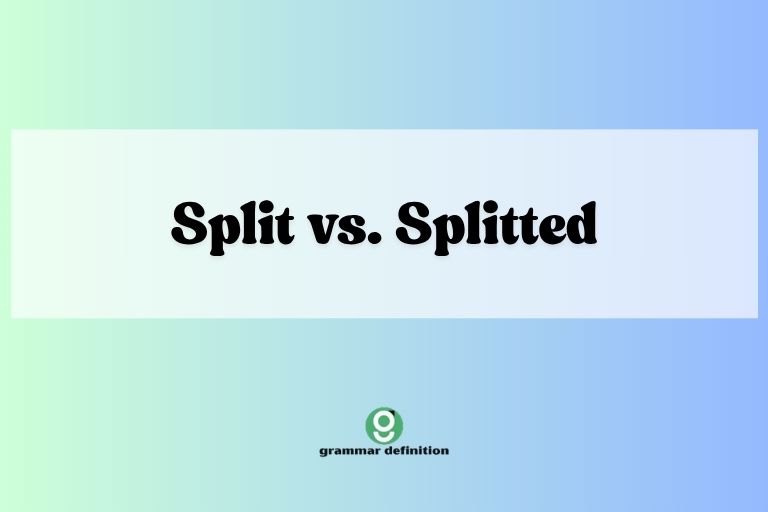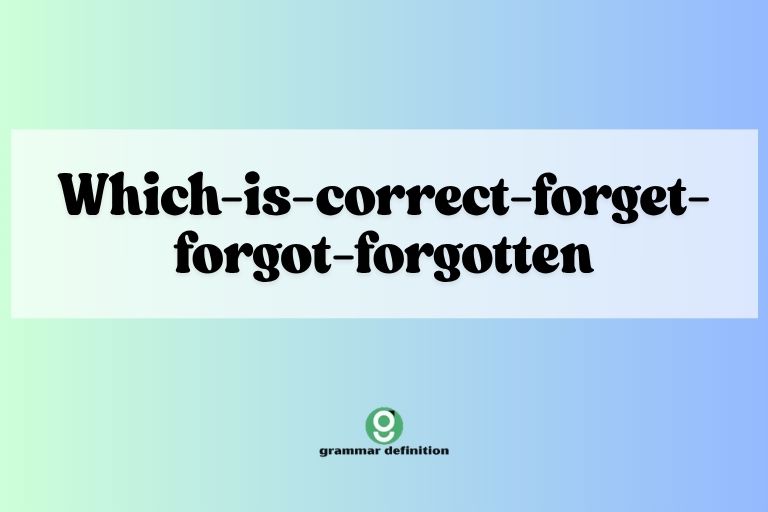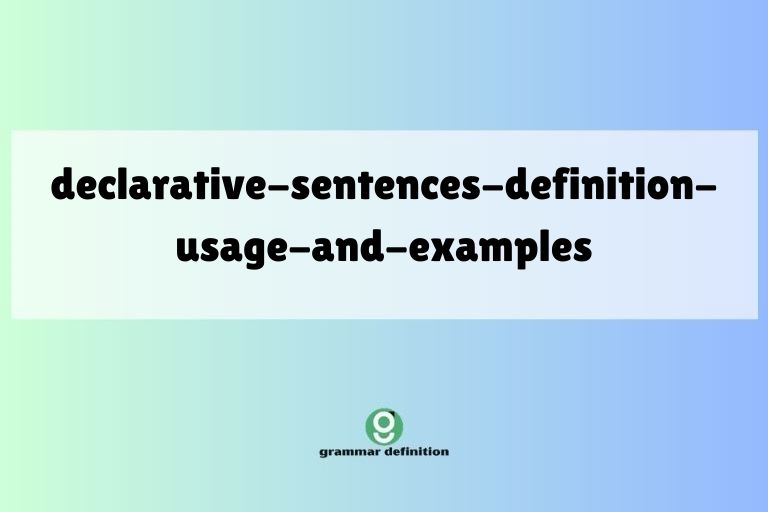Split vs. Splitted: Mastering the Past Tense of ‘Split’

Understanding irregular verbs is crucial for mastering English grammar. One such verb that often causes confusion is “split.” Is the past tense “split” or “splitted”?
This article will delve into the correct usage of “split” in various tenses, clarify its irregular nature, provide numerous examples, and offer practice exercises to solidify your understanding. Whether you’re a beginner or an advanced learner, this guide will help you confidently use “split” in your writing and speech.
This comprehensive guide is designed to help English language learners, writers, and anyone looking to improve their grammar skills. We’ll cover everything from the basic definition of “split” to advanced usage scenarios, ensuring a thorough understanding of this versatile verb.
Table of Contents
- Introduction
- Definition of ‘Split’
- Structural Breakdown of ‘Split’
- Forms of ‘Split’
- Examples of ‘Split’ in Sentences
- Usage Rules for ‘Split’
- Common Mistakes with ‘Split’
- Practice Exercises
- Advanced Topics: Nuances of ‘Split’
- Frequently Asked Questions
- Conclusion
Definition of ‘Split’
The word “split” is a versatile verb with several meanings, generally revolving around the idea of dividing or separating something. It can be used both transitively (taking an object) and intransitively (not taking an object).
Understanding its different meanings is crucial for using it correctly.
Classification: Irregular Verb
Function: To divide, separate, or break into parts; to share something; to depart or leave suddenly.
Contexts: Commonly used in discussions about division, sharing, departures, and physical breakage.
Here’s a breakdown of some common meanings:
- To divide into parts: “I split the pizza with my friend.”
- To separate or break apart: “The wood split under the pressure.”
- To share something: “Let’s split the bill.”
- To depart or leave: “He split from the group.”
Structural Breakdown of ‘Split’
The verb “split” belongs to a class of irregular verbs in English where the base form, past simple, and past participle are identical. This means that the same form, “split,” is used for all three tenses.
Base Form: split (e.g., “I split the log.”)
Past Simple: split (e.g., “Yesterday, I split the log.”)
Past Participle: split (e.g., “I have split the log.”)
The simplicity of its form can be deceiving, as understanding the context is key to correctly interpreting the tense. Auxiliary verbs (like “have,” “had,” “is,” “was”) help to clarify the tense and usage.
For example:
- Present Simple: I split.
- Past Simple: I split.
- Present Perfect: I have split.
- Past Perfect: I had split.
- Present Continuous: I am splitting.
- Past Continuous: I was splitting.
Forms of ‘Split’
The verb “split” maintains its form across different tenses, which simplifies its conjugation. However, understanding how it’s used with auxiliary verbs in different tenses is essential.
Simple Tenses
In simple tenses, “split” is straightforward:
- Present Simple: I/You/We/They split; He/She/It splits
- Past Simple: I/You/He/She/It/We/They split
- Future Simple: I/You/He/She/It/We/They will split
Perfect Tenses
Perfect tenses use auxiliary verbs “have,” “has,” or “had” with the past participle “split”:
- Present Perfect: I/You/We/They have split; He/She/It has split
- Past Perfect: I/You/He/She/It/We/They had split
- Future Perfect: I/You/He/She/It/We/They will have split
Continuous Tenses
Continuous tenses use the “splitting” form with appropriate forms of “be”:
- Present Continuous: I am splitting; You/We/They are splitting; He/She/It is splitting
- Past Continuous: I/He/She/It was splitting; You/We/They were splitting
- Future Continuous: I/You/He/She/It/We/They will be splitting
Perfect Continuous Tenses
These tenses combine “have/has/had been” with the “splitting” form:
- Present Perfect Continuous: I/You/We/They have been splitting; He/She/It has been splitting
- Past Perfect Continuous: I/You/He/She/It/We/They had been splitting
- Future Perfect Continuous: I/You/He/She/It/We/They will have been splitting
Examples of ‘Split’ in Sentences
To illustrate the usage of “split,” here are several examples categorized by tense and meaning. These examples will show how “split” is used in different contexts and with different auxiliary verbs.
Examples in Simple Tenses
This table illustrates the use of “split” in simple present, past, and future tenses.
| Tense | Sentence | Explanation |
|---|---|---|
| Present Simple | Every day, I split wood for the fireplace. | Describes a habitual action. |
| Present Simple | The company splits its profits among the shareholders. | Describes a general truth or regular occurrence. |
| Past Simple | Yesterday, she split the apple in half. | Describes a completed action in the past. |
| Past Simple | The hikers split up to cover more ground. | Describes a completed action in the past. |
| Future Simple | Tomorrow, we will split the tasks between us. | Describes an action that will happen in the future. |
| Future Simple | They will split the prize money if they win. | Describes an action that will happen in the future. |
| Present Simple | He splits his time between London and New York. | Describes a habitual action. |
| Past Simple | The earthquake split the road open. | Describes a completed action in the past. |
| Future Simple | The team will split into smaller groups for the exercise. | Describes an action that will happen in the future. |
| Present Simple | The river splits the town in two. | Describes a general truth or regular occurrence. |
| Past Simple | We split the cost of the gift. | Describes a completed action in the past. |
| Future Simple | They will split the profits evenly. | Describes an action that will happen in the future. |
| Present Simple | The seam splits easily under pressure. | Describes a general truth or regular occurrence. |
| Past Simple | The group split after the argument. | Describes a completed action in the past. |
| Future Simple | She will split her attention between the two projects. | Describes an action that will happen in the future. |
| Present Simple | The atom splits during nuclear fission. | Describes a general truth in science. |
| Past Simple | The party split due to ideological differences. | Describes a past event. |
| Future Simple | We will split the workload to finish on time. | Describes a planned future action. |
| Present Simple | The ice splits under the weight. | Describes a natural occurrence. |
| Past Simple | The magician split the box in two. | Describes a past performance. |
| Future Simple | The shares will split after the merger. | Describes a future financial event. |
| Present Simple | The path splits at the fork in the road. | Describes a regular occurrence. |
| Past Simple | The band split up after their tour. | Describes a past event. |
| Future Simple | They will split the inheritance between them. | Describes a future financial event. |
Examples in Perfect Tenses
This table illustrates the use of “split” in present perfect, past perfect, and future perfect tenses.
| Tense | Sentence | Explanation |
|---|---|---|
| Present Perfect | I have split the firewood for the winter. | Describes a completed action with relevance to the present. |
| Present Perfect | The company has split into two divisions. | Describes a completed action with relevance to the present. |
| Past Perfect | By the time I arrived, he had already split the cake. | Describes an action completed before another action in the past. |
| Past Perfect | They had split the profits before the audit began. | Describes an action completed before another action in the past. |
| Future Perfect | By next year, they will have split the atom. | Describes an action that will be completed by a specific time in the future. |
| Future Perfect | By the time we arrive, she will have split the group into teams. | Describes an action that will be completed by a specific time in the future. |
| Present Perfect | She has split her time between her family and career. | Describes an action that started in the past and continues to the present. |
| Past Perfect | He had split the bill before I even offered to pay. | Describes an action completed before another action in the past. |
| Future Perfect | By the end of the day, they will have split the data into categories. | Describes an action that will be completed by a specific time in the future. |
| Present Perfect | The country has split into several factions. | Describes a situation that started in the past and continues to the present. |
| Past Perfect | They had split the workload before the deadline arrived. | Describes an action completed before another action in the past. |
| Future Perfect | By the time the project is finished, they will have split the tasks evenly. | Describes an action that will be completed by a specific time in the future. |
| Present Perfect | The team has split due to internal conflicts. | Describes a situation that started in the past and continues to the present. |
| Past Perfect | She had split the wood before the storm started. | Describes an action completed before another action in the past. |
| Future Perfect | By the time we return, they will have split the funds among the charities. | Describes an action that will be completed by a specific time in the future. |
| Present Perfect | The scientist has split the molecule in the lab. | Highlights a recent achievement. |
| Past Perfect | They had split the expenses before the trip ended. | Indicates a completed action before another past event. |
| Future Perfect | By the time we meet, they will have split the agenda items. | Indicates a future action completed before another future event. |
| Present Perfect | The ice has split, making the crossing dangerous. | Describes a present condition resulting from a past action. |
| Past Perfect | The crew had split the loot before the authorities arrived. | Describes an action completed before another past event. |
| Future Perfect | By the next shareholder meeting, the company will have split its assets. | Describes a future financial event. |
| Present Perfect | The road has split due to the earthquake. | Describes a present condition resulting from a past action. |
| Past Perfect | The band had split before their greatest hit was released. | Describes an action completed before another past event. |
| Future Perfect | By the time the lawsuit is settled, they will have split the compensation. | Describes a future financial event. |
Examples in Continuous Tenses
This table illustrates the use of “splitting” in present continuous, past continuous, and future continuous tenses.
| Tense | Sentence | Explanation |
|---|---|---|
| Present Continuous | I am splitting the logs for the fire right now. | Describes an action happening at the moment of speaking. |
| Present Continuous | The cell is splitting during mitosis. | Describes an action happening at the moment of speaking. |
| Past Continuous | She was splitting the cake when the guests arrived. | Describes an action in progress at a specific time in the past. |
| Past Continuous | They were splitting the tasks when the manager interrupted. | Describes an action in progress at a specific time in the past. |
| Future Continuous | Tomorrow, I will be splitting my time between two projects. | Describes an action that will be in progress at a specific time in the future. |
| Future Continuous | Next week, they will be splitting the team into smaller units. | Describes an action that will be in progress at a specific time in the future. |
| Present Continuous | He is splitting his focus between work and family. | Describes an action happening at the moment of speaking. |
| Past Continuous | We were splitting the bill when the waiter brought the check. | Describes an action in progress at a specific time in the past. |
| Future Continuous | They will be splitting the data into categories all afternoon. | Describes an action that will be in progress at a specific time in the future. |
| Present Continuous | The group is splitting due to disagreements. | Describes an action happening at the moment of speaking. |
| Past Continuous | She was splitting the wood when it started to rain. | Describes an action in progress at a specific time in the past. |
| Future Continuous | We will be splitting the funds among the charities next month. | Describes an action that will be in progress at a specific time in the future. |
| Present Continuous | The atom is splitting in the reactor. | Describes an action happening at the moment of speaking. |
| Past Continuous | They were splitting the profits when the scandal broke. | Describes an action in progress at a specific time in the past. |
| Future Continuous | She will be splitting her attention between her studies and her job. | Describes an action that will be in progress at a specific time in the future. |
| Present Continuous | The scientist is splitting the sample for analysis. | Describes a current activity in the lab. |
| Past Continuous | They were splitting the money when the police arrived. | Describes an interrupted action in the past. |
| Future Continuous | We will be splitting the earnings at the end of the year. | Describes an ongoing future activity. |
| Present Continuous | The ice is splitting further with each passing hour. | Describes a worsening current situation. |
| Past Continuous | The robbers were splitting the loot when they were caught. | Describes an interrupted action in the past. |
| Future Continuous | The investors will be splitting the dividends in the coming months. | Describes a financial action that will be in progress in the future. |
| Present Continuous | The road is splitting due to the ongoing tremors. | Describes a situation that is currently happening. |
| Past Continuous | The band was splitting up before they decided to give it another try. | Describes an action that was in progress in the past. |
| Future Continuous | They will be splitting the assets after the divorce is finalized. | Describes a future legal or financial event in progress. |
Usage Rules for ‘Split’
The primary rule for using “split” is to remember that its past simple and past participle forms are the same as its base form. Avoid the incorrect form “splitted.” Context and auxiliary verbs will help determine the tense.
- Correct: I split the apple. (Past Simple)
- Correct: I have split the apple. (Present Perfect)
- Incorrect: I splitted the apple.
When using continuous tenses, the form “splitting” is used correctly.
- Correct: I am splitting the wood. (Present Continuous)
- Correct: I was splitting the wood. (Past Continuous)
Pay attention to the context to ensure the correct interpretation of the tense. For instance, “I split” could mean either present simple or past simple, depending on the surrounding information.
Examples:
- Present Simple: I split the firewood every week.
- Past Simple: I split the firewood yesterday.
Common Mistakes with ‘Split’
The most common mistake is using “splitted” as the past tense or past participle. This is incorrect; the correct form is always “split.”
| Incorrect | Correct | Explanation |
|---|---|---|
| I splitted the bill with my friend. | I split the bill with my friend. | “Split” is the correct past simple form. |
| They have splitted the prize money. | They have split the prize money. | “Split” is the correct past participle form. |
| He was splitted from his group. | He was split from his group. | “Split” is the correct past participle form in passive voice. |
Another common mistake is misinterpreting the tense due to the identical forms. Always look for context clues and auxiliary verbs to clarify the meaning.
Example:
- Ambiguous: I split the log.
- Clear (Past Simple): Yesterday, I split the log.
- Clear (Present Simple): Every week, I split the log.
Practice Exercises
Test your understanding of “split” with these exercises. Fill in the blanks with the correct form of “split.”
Exercise 1: Simple Tenses
- Yesterday, I ______ the firewood.
- Every week, she ______ the cost with her roommates.
- Tomorrow, they will ______ the tasks among themselves.
- Last year, the company ______ into two divisions.
- Next month, the team will ______ into smaller groups.
- He always ______ the difference.
- The road ______ in two after the earthquake.
- We ______ the cake in half.
- She ______ the money with her brother.
- They ______ the vote.
Exercise 2: Perfect Tenses
- I have ______ the pizza already.
- They had ______ the workload before the deadline.
- By next year, she will have ______ her time effectively.
- We have ______ the profits evenly.
- The group had ______ before the project ended.
- He has ______ his attention between two jobs.
- The country has ______ into different factions.
- She had ______ the bill by the time I arrived.
- They will have ______ the money by the end of the day.
- I had ______ the logs before it started raining.
Exercise 3: Continuous Tenses
- I am ______ the logs right now.
- They were ______ the tasks when I arrived.
- Tomorrow, she will be ______ her time between meetings.
- We are ______ the costs.
- The team was ______ into groups.
- He is ______ his attention.
- The country is ______ apart.
- She was ______ the wood.
- They will be ______ the prize money.
- I am ______ my focus.
Answer Key
Exercise 1: Simple Tenses
- split
- splits
- split
- split
- split
- splits
- split
- split
- split
- split
Exercise 2: Perfect Tenses
- split
- split
- split
- split
- split
- split
- split
- split
- split
- split
Exercise 3: Continuous Tenses
- splitting
- splitting
- splitting
- splitting
- splitting
- splitting
- splitting
- splitting
- splitting
- splitting
Advanced Topics: Nuances of ‘Split’
Beyond the basic tenses, “split” can be used in more nuanced contexts, such as phrasal verbs and idiomatic expressions. Understanding these can enhance your fluency and comprehension.
Phrasal Verbs:
- Split up: To end a relationship or marriage. “They decided to split up after five years.”
- Split off: To separate or break away from something. “A section of the glacier split off.”
- Split on: (British English) To inform on someone. “He split on his friends to the police.”
Idiomatic Expressions:
- Split hairs: To argue about trivial or unimportant details. “We’re just splitting hairs; the main point is agreed.”
- Split the difference: To compromise by meeting halfway. “They couldn’t agree on the price, so they split the difference.”
Additionally, consider the use of “split” in passive voice constructions:
- Passive Voice: The company was split into two divisions.
Frequently Asked Questions
- Q: Is “splitted” ever correct?
A: No, “splitted” is never the correct form. The past simple and past participle of “split” is always “split.”
- Q: How do I know if “split” is past simple or present simple?
A: Context is key. Look for time markers (e.g., “yesterday,” “every day”) and auxiliary verbs to determine the tense. For example, “I split the wood yesterday” (past simple) versus “I split the wood every week” (present simple).
- Q: What are some common phrasal verbs with “split”?
A: Common phrasal verbs include “split up” (end a relationship), “split off” (separate), and “split on” (inform on someone – British English).
- Q: How is “split” used in continuous tenses?
A: In continuous tenses, use the form “splitting” with the appropriate form of “be” (am, is, are, was, were, will be). For example, “I am splitting the wood” (present continuous).
- Q: Can “split” be used in the passive voice?
A: Yes, “split” can be used in the passive voice. For example, “The group was split into teams.”
- Q: What does “split hairs” mean?
A: “Split hairs” is an idiom that means to argue about trivial or unimportant details.
- Q: What’s the difference between “split up” and “split off”?
A: “Split up” usually refers to ending a relationship, while “split off” means to separate or break away from something, often physically.
- Q: How can I remember that the past tense of “split” is also “split”?
A: Associate “split” with other irregular verbs that have the same form in the base, past simple, and past participle (e.g., “cut,” “hit,” “hurt”). Practice using “split” in different tenses to reinforce the correct form.
Conclusion
Mastering the verb “split” requires understanding its irregular nature and recognizing that its base form, past simple, and past participle are all “split.” Avoid the common mistake of using “splitted.” Pay close attention to context and auxiliary verbs to determine the correct tense. By practicing with the examples and exercises provided, you can confidently use “split” in your writing and speech.
Remember to focus on the context and auxiliary verbs to determine the correct tense when using “split.” Consistent practice will solidify your understanding and prevent common errors. With these tips, you’ll be well-equipped to use “split” accurately and effectively in your English communication.






